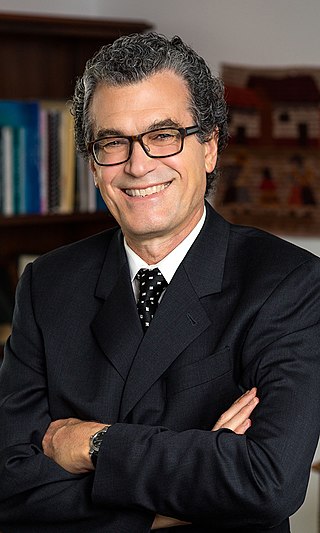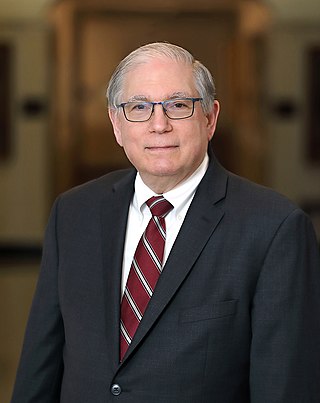The National Institute of Mental Health (NIMH) is one of 27 institutes and centers that make up the National Institutes of Health (NIH). The NIH, in turn, is an agency of the United States Department of Health and Human Services and is the primary agency of the United States government responsible for biomedical and health-related research.

Louis Wade Sullivan is an active health policy leader, minority health advocate, author, physician, and educator. He served as the Secretary of the United States Department of Health and Human Services during President George H. W. Bush's Administration and was Founding Dean of the Morehouse School of Medicine.
The National Cancer Institute (NCI) coordinates the United States National Cancer Program and is part of the National Institutes of Health (NIH), which is one of eleven agencies that are part of the U.S. Department of Health and Human Services. The NCI conducts and supports research, training, health information dissemination, and other activities related to the causes, prevention, diagnosis, and treatment of cancer; the supportive care of cancer patients and their families; and cancer survivorship.
The Eunice Kennedy Shriver National Institute of Child Health and Human Development (NICHD) is one of the National Institutes of Health (NIH) in the United States Department of Health and Human Services. It supports and conducts research aimed at improving the health of children, adults, families, and communities, including:
Health Disparities Centers are institutions in the United States that cover a broad range of needs and focus areas to decrease currently disproportionate illness and disease rates that lead to health disparities. They also promote the engagement, empowerment and recruitment of underrepresented populations in health professions. Many programs devote significant resources to developing cultural competency training to promote the delivery of culturally sensitive healthcare by faculty and staff, as well as current and future healthcare providers. These services are usually tailored to meeting specific goals or missions of the individual components common in most of the operating Health Disparities Centers.
The PhenX Toolkit is a web-based catalog of high-priority measures related to complex diseases, phenotypic traits and environmental exposures. These measures were selected by working groups of experts using a consensus process. PhenX Toolkit's mission is to provide investigators with standard measurement protocols for use in genomic, epidemiologic, clinical and translational research. Use of PhenX measures facilitates combining data from a variety of studies, and makes it easy for investigators to expand a study design beyond the primary research focus. The Toolkit is funded by the National Human Genome Research Institute (NHGRI) of the National Institutes of Health (NIH) with co-funding by the Office of the Director (OD), the National Institute of Neurological Disorders and Stroke (NINDS), and the National Heart, Lung, and Blood Institute (NHLBI). Continuously funded since 2007, PhenX has received funding from a variety of NIH institutes, including the National Institute on Drug Abuse (NIDA), the National Institute on Mental Health (NIMH), the National Cancer Institute (NCI) and the National Institute on Minority Health and Health Disparities (NIMHD). The PhenX Toolkit is available to the scientific community at no cost.
M. Roy Wilson M.D., M.S. is the President of Wayne State University.

Marie A. Bernard, M.D. is the Chief Officer for Scientific Workforce Diversity at the National Institutes of Health (NIH). Prior to this, she was the deputy director of the National Institute on Aging at the NIH, where she oversaw approximately $3.1 billion in research focused on aging and Alzheimer's disease. Bernard co-leads the NIH UNITE initiative, launched in 2021 to end structural racism in biomedicine. She co-chairs the Inclusion Governance Committee, which promotes inclusion in clinical research by sex/gender, race/ethnicity, and age. She also co-chairs two of the Department of Health and Human Services Healthy People 2020 objectives: 1) Older Adults, and 2) Dementias, including Alzheimer's disease. Prior to arriving at NIH in 2008, Bernard served as Donald W. Reynolds Chair in Geriatric Medicine and founding chairperson of the Donald W. Reynolds Department of Geriatric Medicine at the University of Oklahoma College of Medicine, and Associate Chief of Staff for Geriatrics and Extended Care at the Oklahoma City Veterans Affairs Medical Center.

Yvonne T. Maddox is an American academic who currently works as vice president for research at the Uniformed Services University. She was previously the acting director of the National Institute on Minority Health and Health Disparities. Her career at the National Institutes of Health also includes previous leadership roles as acting deputy director of the National Institutes of Health and deputy director of the Eunice Kennedy Shriver National Institute of Child Health and Human Development.
Linda Burhansstipanov is an American public health educator and researcher. She is a member of the Cherokee Nation of Oklahoma and specializes on cancer care and support in Native American communities. A leader in Native American cancer research, she is the founder and president of the Native American Cancer Research Corporation, a non-profit organization that studies how the unique situations of Native Americans interact with cancer treatment. She is also a member of the National Institutes of Health national advisory council on Minority Health and Health Disparities. Native American communities have distinctive cultural beliefs and communicative practices, and are often impacted by social determinants of health related to poverty and associated public health concerns. Burnhansstipanov has worked on a broad array of research projects related to how such factors shape community's understandings of cancer and treatment. She is also an expert on Community-based participatory research, which aims to empower communities as equal participants in the research process and has published several articles using this methodology.

Eliseo J. Pérez-Stable is a Cuban-American physician-scientist. He is the director of the National Institute on Minority Health and Health Disparities.

Anna María Nápoles is an American behavioral epidemiologist and science administrator. She is the Scientific Director of the Intramural Research Program at the National Institute on Minority Health and Health Disparities. She was a professor and epidemiologist at University of California, San Francisco.

Lisa Bowleg is an applied social psychologist known for conducting research on intersectionality in social and behavioral science and the relationship between social-contextual factors and stress, resilience, and HIV risk in Black communities.

Monica S. Webb Hooper is an American behavioral scientist and clinical psychologist serving as deputy director of the National Institute on Minority Health and Health Disparities. She was a professor at Case Western Reserve University and associate director for cancer disparities research and director of the Office of Cancer Disparities Research in the Case Comprehensive Cancer Center.

Girardin Jean-Louis is an American academic who is a Professor in the Departments of Psychiatry and Neurology at the University of Miami, Miller School of Medicine. He serves as Director of the Translational Sleep and Circadian Sciences Program and the "Program to Increase Diversity among Individuals Engaged in Health-Related Research" Institute. Dr. Jean-Louis’ translational behavioral sleep and circadian research was recently featured in Science and NPR. In 2020, he was named ‘Pioneer in Minority Health and Health Disparities’ and one of the Community of Scholars' most inspiring Black scientists in America. In 2021, he received the Mary A. Carskadon Outstanding Educator Award from the Sleep Research Society, and in 2022 the Diversity, Equity, and Inclusion Leadership Award from the American Academy of Sleep Medicine.

Lawrence A. Tabak is an American dentist and biomedical scientist serving as the acting director of the National Institutes of Health. He is the principal deputy director of the National Institutes of Health. Tabak was director of the National Institute of Dental and Craniofacial Research from 2000 to 2010.

Shannon Nicole Zenk is an American nurse scientist specialized in researching social inequities and health disparities. She is director of the National Institute of Nursing Research.

Tara A. Schwetz is an American biophysicist and government administrator who is currently serving as the Acting Principal Deputy Director of the National Institutes of Health (NIH).
Ricardo Felipe Muñoz is an academic, psychologist, and author. He is Distinguished Professor of Clinical Psychology at Palo Alto University, and Professor Emeritus of Psychology at the School of Medicine at the University of California, San Francisco. He serves as Adjunct Clinical Professor at Stanford University, and Affiliated Faculty at the University of California, Berkeley.
















